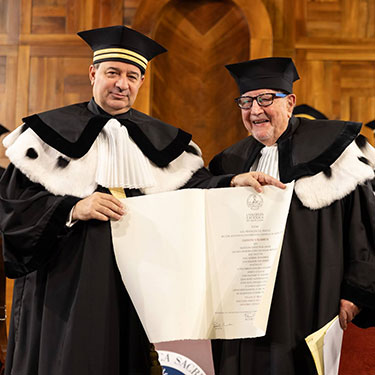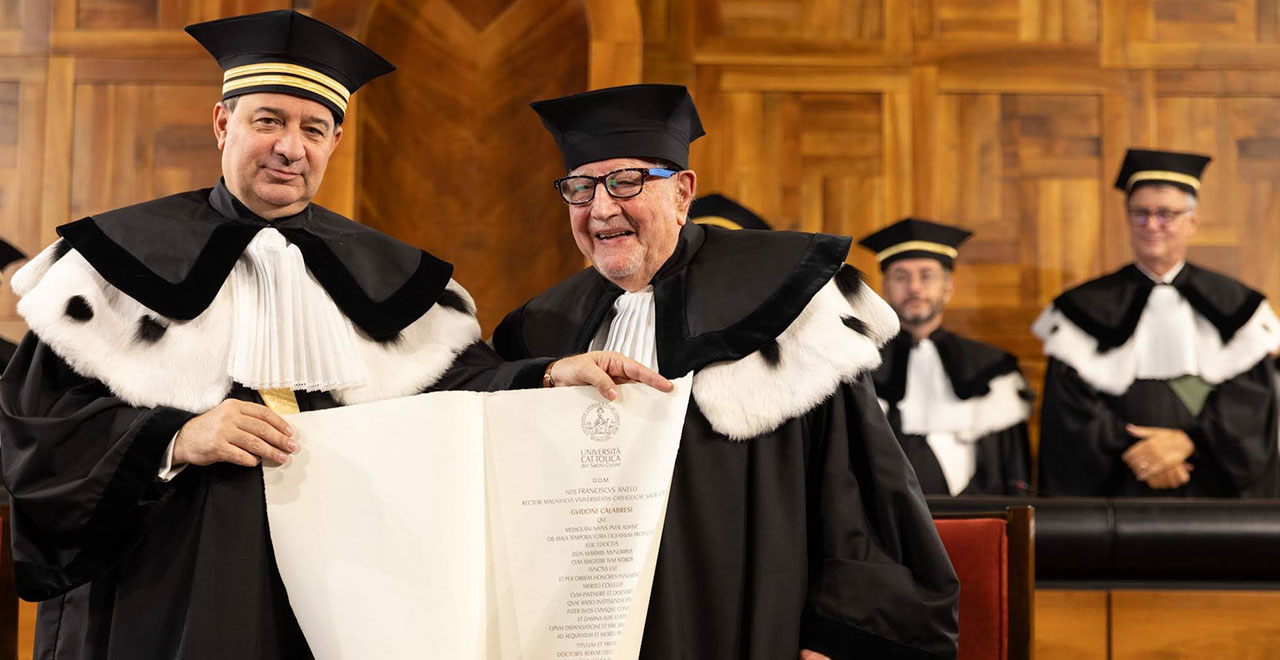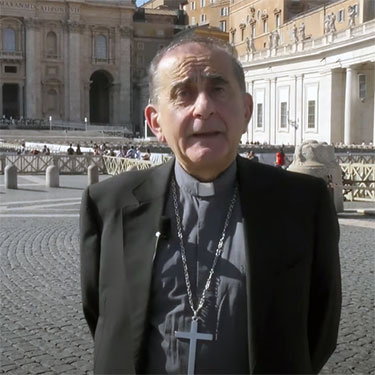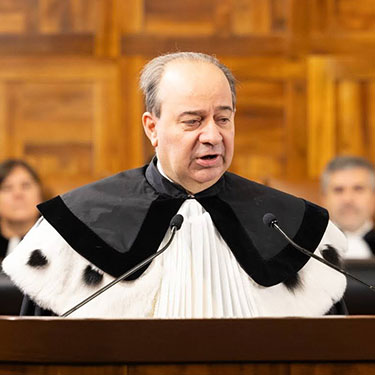On the occasion of the inauguration of the 2023-2024 academic year on Wednesday 25 October, Università Cattolica del Sacro Cuore conferred an honorary degree in Economics on the jurist Guido Calabresi, professor emeritus at Yale University, teacher of the best generation of US academics and judges, four of whom are currently Supreme Court justices. A lecturer who has helped thousands of students find meaning in their work, as the Rector Franco Anelli said in his inaugural speech in the Aula Magna, quoting the words of Calabresi himself: “It was the relationship with young people that strengthened my desire to teach. They loved me, and I loved them and had an ability to make them flourish. It was important to make them understand that one can do the common good, no matter how one thinks.”
The day opened in the Basilica of Sant'Ambrogio with the Eucharistic Celebration presided over by Monsignor Claudio Giuliodori, General Ecclesiastical Assistant of Università Cattolica, who, on the day of the liturgical memory of Blessed Don Carlo Gnocchi, Spiritual Assistant of the University from 1946 to 1948 at the behest of Father Gemelli, recalled his “radical witness of charity towards the smallest and neediest.”
In his speech, the Rector offered a scenario analysis of the present and future of the university system. “Universities are not start-ups,” said Professor Anelli. “They do not spring from the intuition of a businessman and then grow to be mature enough to be sold to an investor. Contestability is not a value of the universities. Their perpetuity, it is. Their ability to change while remaining true to themselves, making themselves relevant through knowledge and research, which makes them constantly modern.”
And this challenge has placed the universities at a crossroads: “Choose whether to take a ‘prudent’, defensive attitude, containing costs but also ambitions; or pursue a policy of expansion and reorganisation, accepting to invest, and thus take risks, to open up new perspectives.”
Already at the time of the previous Strategic Plan (2019), Università Cattolica opted, “out of motivated confidence”, for the “path of growth”. The numbers confirm this. As far as teaching is concerned, from 2013-2014 to 2022-2023, the number of students on three-year degree programmes, graduate and integrated degree programmes “increased from 36,775 to 42,287, an increase of 15%, associated with a 21% reduction in supplementary year students, the result of specific support and tutoring policies.”
On the research side, the indicator of the ability to attract funds increased significantly: “In 2022, the value of the ‘Research Portfolio’, i.e. the total volume of projects active in the year, was EUR 122 million, for 1,316 projects.” It should also be noted that more than 40 professors from Università Cattolica “rank in the top 2% of the world rankings in their disciplines”.
Regarding the internationalisation process, “there are 37 double degrees and the number of international students enrolled in degree programmes has doubled in the last five years. The community of foreign students enrolled at Università Cattolica, considering all years of the programmes, is around 3,000, with 165 nationalities represented and we are sixth in Europe in terms of the number of outgoing students.”
There has been no lack of planning on the space front in recent years. “At the Milan site, the ‘conquest’ of the Caserma Garibaldi has taken a decisive step with the start of renovation work on the Santa Valeria wing in 2023, which is expected to be completed in time to make new spaces available from the second semester of the 2024-2025 academic year.” The project includes the construction of 36 classrooms with a total capacity of approximately 1,800 student seats, a 150-seat conference hall, and spaces set up in the common areas for study and socialising for students, amounting to more than 500 seats. In all locations, investments have been planned to increase the supply of places in boarding schools and residences.
These initiatives are designed to offer a response to the increase in the student population over the last ten years. “But all growth curves bend sooner or later,” Professor Anelli pointed out, wondering “what position we should take in the coming years, in a landscape marked by the polarisation between universities qualified in teaching and research, and offers of educational products that are increasingly openly sensitive to market objectives.”
For this reason, “the most significant effort that will be required in the coming years,” concluded the Rector, “will be to recalibrate the educational proposal as a whole, continuing along the path already effectively embarked upon, to develop solid, rigorous and at the same time modern study paths, to define the optimal quantitative thresholds to ensure the best for all students, and above all to ensure that students find meaning in their commitment.”
After the inaugural address, the Archbishop of Milan Monsignor Mario Delpini, busy in Rome with the work of the Synod, addressed his greetings as president of the Istituto Giuseppe Toniolo di Studi Superiori, through a video message from St. Peter's Square, “so dear to all of us Catholics.” The Archbishop expressed the desire for Università Cattolica to renew “its original inspiration, bearing in mind the times in which we live, the path we have travelled and the world that has changed” and urged the University to “offer in the field of culture not only erudition but wisdom, and, in the field of science and professional qualification, not only competence but also motivation to make this competence a service.”
The honorary degree awarding ceremony was introduced by the laudatio delivered by the Dean of the Faculty of Economics Antonella Occhino, who recalled the reasons for the award. “The proposal to award an honorary degree in Economics to Guido Calabresi stems from the desire to honour the extraordinary figure of a protagonist in the applied sciences of law and economics, unanimously recognised for his pioneering studies on Law and Economics, which have had a decisive impact on the advancement of legal research on liability and economic research on behaviour, making a significant contribution to civil, economic and social progress”. After the solemn reading of the degree certificate in Latin by Professor Carlo Mazzucchi and after the conferral of the honorary degree, Professor Calabresi - who expressed his joy at opening the academic year “of this great University” and at receiving a degree as a Milanese after 70 years since he was forced to leave Italy - gave the lecture on the topic “Law and Economics: the answer of law”.
His lecture was a great fresco of the process of criticism that various disciplines have posed in the 20th century to a conception of law as a separate, “immutable and self-sufficient” subject. Starting with economists, the first to question its rationality, especially in America, “where this is still the only way to look at law”. The response of jurists to this challenge, Professor Calabresi explained, was twofold: “On the one hand, distinguishing the role of academics from that of creators of law.” The former, unlike the latter, whose decisions determine immediate effects, “can and must write down what they think is true for them, ‘even if the sky were to fall’, i.e. without considering the consequences of their statements”, but avoiding the claim that their conclusions are immediately applicable.
On the other hand, “law responds to the criticism of economics, philosophy, sociology and history, asking them for greater depth, a rediscovery of certain values that they should take into account by their very nature and showing their ability to accept the challenge they pose and propose themselves as an amalgam of disciplines that are not separate as in university departments.” This is the high road to “a right that leads to a justice, which, taking a system of disciplines, looks at them, uses them and tries to put them together to create something just and good.”







